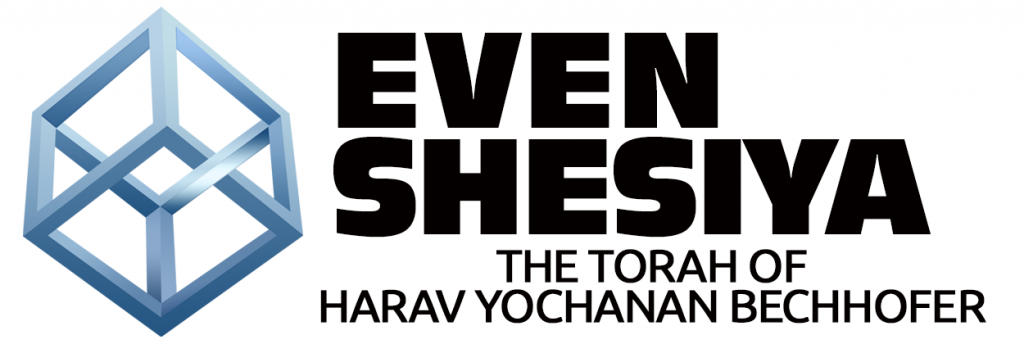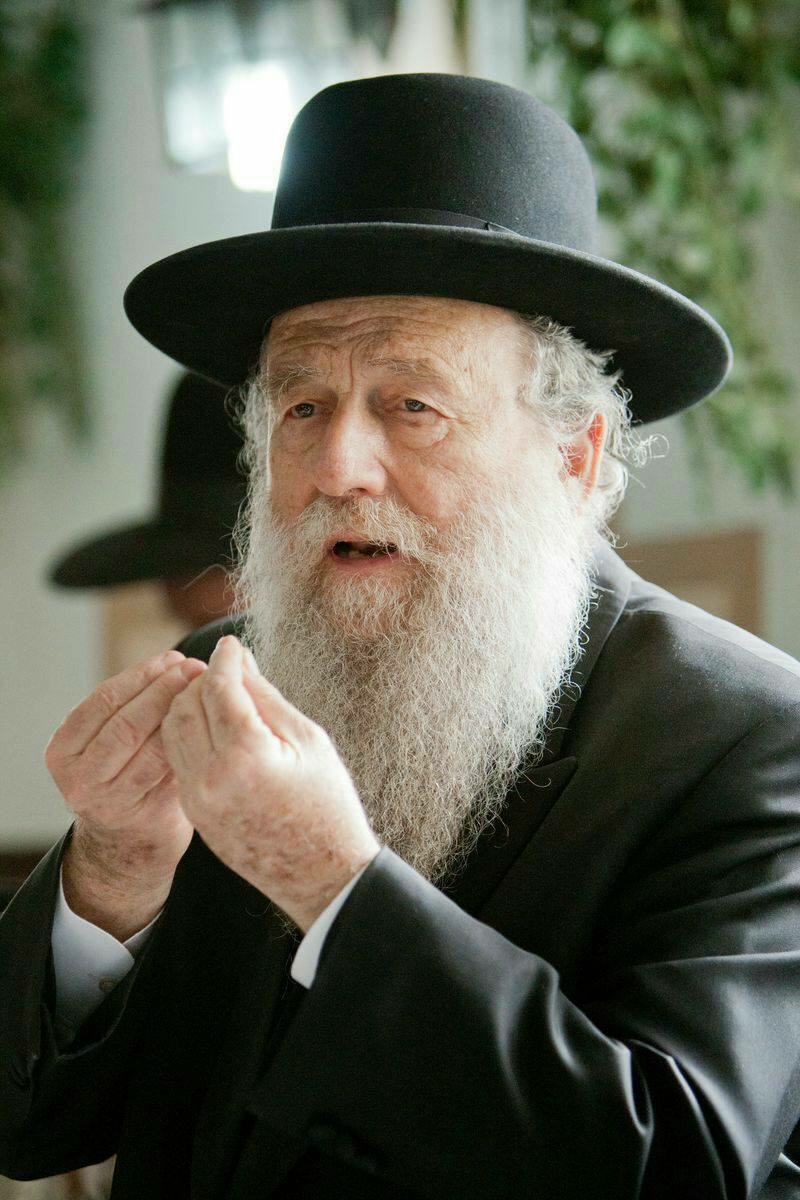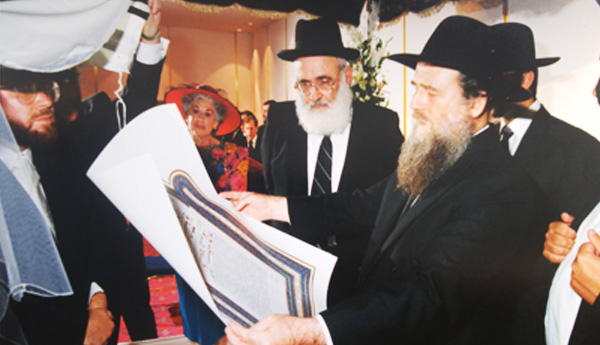Click here to download PDF

City Court
The Parsha opens with the Mitzvah to set up Batei Dinim in all the tribes and all the major cities. It is interesting to note that this strict halacha of a Beis Din in every major city is strictly in the land of Israel. Whereas, in the Diaspora the obligation is to set up a Beis Din in every “plach”- county or region and not in every major city. Seemingly there should be no delineation between the land of Israel and the Diaspora. The Jewish court system should simply be adequate to deal with the density of the Jewish population wherever they are.
Life & Land
After issuing the prohibitions of not being biased in judgement or taking bribes, the Torah says (16:20) “Justice, justice pursue so that you should live and inherit the land that Hashem your Lord gives you”. Rashi brings the Chazal regarding the words “in order that you should live and inherit”: “worthy is appointing qualified judges to give life to the Jewish people and to have them settled on their land”. Seemingly pursuing justice is the most basic principle in Judaism. What does it innately have to do with meriting life in general and security in the land of Israel? Furthermore, we would think that ‘pursuing justice’ is having a ‘just society’, but that is not what Rashi says. He says appointing qualified judges alone gives the merit of life and being settled in the land of Israel. One would think that appointing judges is just the means to the end….
Justice & Justice
The first part of this Pasuk “Justice, justice pursue”, the doubling of the term justice is troublesome, and Chazal respond to that obvious problem and say drashos. The drasha that Rashi brings is to go to a “good Beis din”. What about doubling the word ‘justice’ implies a good Beis Din? Just saying ‘justice’ once would be commanding us to seek a Beis Din that metes out correct judgement. What is the significance of doubling the word justice, that implies a “good Beis Din”? As opposed to what?
Justice Judgement Right & Left
The Midrash in this week’s Parsha says as follows “said Rav Yitzchak, two things are in Hashem’s right hand, justice and Torah, as it says “justice fills Your Right Hand (Tehillim 48) and Torah, as it says, “in His Right is the fire of the law” (Devarim 33). The Midrash continues, two things are in His (Hashem’s) Hand; the Nefesh (part of soul that inhabits the body, see more on this in Even Shesiya on Devarim-Chazon 5779) and the judgement. The Nefesh as it’s written “as in His hand is the Nefesh of all that lives’ (Iyov 12) and judgment, as it says, “and I grab judgement with My Hand” (Devarim 32). Says Hashem, the Nefesh and judgment are in My Hand, guard the judgement and I will guard your Nefesh”. Obviously, the “Hand” that holds the Nefesh and judgment is the “Left Hand”, if Rebbe Yitzchak opened and said two things in the “Right Hand” of Hashem, The Torah and justice. What is the meaning behind the idea that Torah and justice are in the right and judgment and the Nefesh are in the left? What is the difference between justice and judgment?
Idolatry?
After this Pasuk, the Torah breaks off the topic of setting up the court system and discusses prohibitions that are related to idolatry and then, resumes its discussion of setting up the supreme Rabbinical court that sits in the “Lishkas Hagazis” in proximity to the Mizbeach in the Beis HaMikdash. Why is the discussion of setting up our judicial system interspersed with prohibitions of idolatry? This mysterious pattern is in the oral law also. Why was Maseches Avoda Zara that deals with all the prohibitions of idolatry placed in Seder Nezikin which deals with our judicial system and civil law?
Love & Leave the “Matzeiva”?
Amongst the prohibitions of idolatry that are mentioned here, is “is to not set up a “Matzeiva” (a single stone to sacrifice upon, even if the intent is to sacrifice to Hashem) that Hashem hates”. Rashi comments on why the Torah specifies that Hashem hates the Matzeiva and writes “because the Canaanites used it for its idol worship and even though Hashem loved the Matzeiva in the days of the Avos (as the Avos used it to serve Hashem) but now Hashem hates it because it is used for idol worship”. This is very difficult to understand. The idolaters also sacrificed on regular altars and do many things that resemble Mitzvos that we do, and Hashem did not outlaw those practices for us, so why is the Matzeiva different? If it was beloved in the days of the Avos, one would think that using a Matzeiva would only be reminiscent of those ‘good old days’.
The Statues vs Real People
Both the Kuzari (2:30-34) and the Rambam in his famous letter to the Jewish community of Yemen, use the same metaphor to explain two different and yet related concepts. They both speak of a great sculptor who has sculpted a statue that was a perfect replica of a human form. From afar that statue and a real human being would look equally human. It’s only when you get up close, that you would be able to discern that the statue is inanimate, and the real human being has life inside of him. The Kuzari uses this metaphor to explain the difference between the Jewish people and all the other nations of the world. The nations of the world are to the Jewish people like a statue is to a real human being. Those nations don’t have a soul, whereas the Jewish people have a soul which is the Divine presence that clings to and permeates the Jewish people. He explains that this is real secret why we are the eternal nation whereas other nations collapse and disappear. The Kuzari (2:10-18) also says about the land of Israel versus all other lands, that the land of Israel is alive and that’s why, it is referred to as “Eretz hachaim” the land of life and it is his understanding that is why the land of Israel also has Mitzvos like having its own Shabbos, as per the Mitzva of Shmitta. This is also because of the Divine presence that dwells in the land of Israel.
Torah vs Civil Law
The Rambam uses this metaphor to explain the difference between the Torah and all other religions and bodies of law. On the surface, they all talk about only serving one God, truth, justice, and morality. However, if a person merits to get intimately aquatinted with the Torah, he will see its full of “life”, which is the Divine power that permeates it which makes Torah infinitely deep. These two concepts of how only the Jewish people are the “living nation” and how Torah is a “Toras Chaim”- a Torah of life are actually one and the same. As Rav Saadia Gaon said: ‘what makes our nation a unified nation, is its Torah”. Or in the worlds of the Zohar (Acharei mos 73) “there are three that are interconnected: Hashem, The Torah and the Jewish people”.
Right Left Heaven Earth
The Midrash quoted above that derived that Torah and justice are in ‘Hashem’s Right’ and the Nefesh and judgment are in ‘His left’ reflects the Pasuk, “and My Hand founded the earth and My Right set up the sky” (yehsayahu 48). The Gemara in Kesuvos (5) understands this Pasuk to mean that heaven and earth were each created with just one hand of Hashem and if the right upheld the sky, so the hand that founded the earth must be the left hand. The Gemara goes on to say that greater is the Beis HaMikdash that is created with “two hands”, as the Pasuk says “the Mikdash of Hashem was fashioned by your hands” (Shemos 15:17). We explained (see Even Shesiya Beshalach 5779) that the Beis HaMikdash is where the two hands come together as it is the portal where the Heavenly meets the earthly. It’s a two-way street. The Divine Presence comes down from heaven to dwell there and we sacrifice there and elevate the animal and the vegetable to the Heavenly. And this is the secret that the grand rabbinical court must be in the Beis HaMikdash, near the altar because Hashem’s law on earth is the Heavenly coming down to permeate the earthly, like a Nefesh permeates a body.
Tzedek & Tzedaka
With this we can understand the Midrash that Torah and justice are on the “right”. The right represents the Heavenly. Torah was originally in the highest place in Heaven to the point that the angels wanted it for themselves. Justice means when everything is in accordance with Divine Will. Hashem’s ultimate will be to bestow goodness (Derech Hashem 1:2:1). However, that is so long as that goodness is not undeserved. Whenever things are in accordance with Divine justice, there is nothing barring the surge of kindness and that’s the secret that the word “Tzedek” –justice and the word “Tzedaka” – charity, come from the same root. This is clearly alluded to in our daily prayers when we pray for the restoration of justice in the world and we say “restore our judges…. and reign upon us Hashem alone with kindness and mercy…. Blessed are you, Hashem, the King who loves charity and judgment”. In Heaven, where there is no evil inclination, everything is naturally ‘just’ as the Heavenly cannot possibly deviate from Divine will. This was Moshe’s argument to the angels, you don’t need a Torah the way we do, you’re perfect already. Or simply put, in Heaven justice does not have to be pursued, it is the natural state of affairs.
Pursuing Justice
Judgment is in response to a situation where Hashem’s law seems to have been violated, whether someone did an injustice to a fellow man or broke any of the laws of our responsibilities to serve Hashem, and Hashem alone. Judgment does not apply to the Heavenly that can never do wrong. Judgement is for the earthly who can deviate from the Divine justice. The purpose of judgment (Shoftim) and subsequently law enforcement (Shotrim) is to correct the deviations and the final end result will be justice. This is the secret that the guidelines of how to carry out our Mitzvos on earth are also called “Dinim” – laws or judgments. It is not just because they are obligatory, it goes deeper than that. The function of the Mitzvos is to correct and perfect ourselves and the world around us to be in accordance with Divine will, much in the same way that judgment corrects any injustice. In the future, when the world will be totally fixed, just like there will be no necessity for judgment, so also there will be no more Mitzvos because there will be nothing to correct. We will just be enjoying the inner secrets of the Torah that will be revealed at that time. We will be enjoying the Divine light that was hidden within the Mitzvos, but we will not be doing Mitzvos because everything will have been fixed. That’s what it means that “Din” – judgment and “Nefesh”, which is the aspect of the soul that permeates the body are on the “left”. They are to permeate, correct and refine the earthly to infuse it with Divine life.
Mirroring Heaven
With this we can understand in depth the Pasuk, “justice, justice pursue in order that you shall live and inherit the land”. The double term justice is referring to the Heavenly and the earthly. In Heaven justice is the natural state of affairs. On earth, justice needs to be achieved. We must pursue justice through the process of judgment to make the earthly a perfect reflection of the Heavenly. That is the power of life that infuses the Jewish people and that is the unique function of the land of Israel. Just like the land of Israel is where the Heavenly meets the earthly, therefore it is the “place of justice”, as it is often referred to in Tanach. The “Good Beis Din” that we’re supposed to pursue, is not one that just competently applies the law, it is the Beis Din that merits the special Divine assistance to be the vehicle of bringing Divine justice to earth. The Pasuk continues “so that you shall live…..” because Divine justice is like the soul that permeates the Jewish people and the Mitzvos that we do and “will inherit the land” as the land of Israel is where the Divine justice is to be manifest. That’s why it is imperative to set up Batei Dinim in every major city and even the very appointing of the judges is in itself a big Tikun because the land of Israel is alive with the Divine Presence that is manifest in the form of Divine justice. To set up the Batei Dinim is to give the land of Israel its blood vessels that it needs to circulate its spiritual life-force. The lands of the diaspora, which are ‘spiritually dead’ only require Batei Dinim in every province, just so as the people can seek relief to any injustice they suffered, but not in every city, as that land is ‘dead’ anyway.
Idolatry – the Antithesis to Justice
As our justice system is full of Divine life, and not just a social contract, that’s why the opposite of our justice system is idol worship. Torah law infuses the world with Divinity which rids the world of idolatry and vicea versa, there is no greater obstruction to Divine justice than idolatry because Divine justice is to infuse Divinity within the earthly. This is the secret as to why the prohibitions of idolatry are intertwined with the commandment to set up the Torah judicial system. They are the two opposing forces. The one negates the other. This is the secret that Maseches Avoda Zara is in Seder Nezikin. Seder Nezikin is to fix the world and rid it of evil and there is no greater evil than Avoda Zara.
Growing Up
Divine justice was revealed in stages corresponding to the progress that humanity made in their development. Rabbeinu Avraham the son of the Rambam likens the giving of the Torah only after twenty-six generations to a child who only becomes obligated in Mitzvos only after he becomes mentally competent at the age of 13. Humanity had to “grow up” and even after all that, only the Jewish people were worthy to be the carriers of the Torah. In the process of educating a child, initially as he’s born, the child is out of control, only knows and cares about what he wants, nothing else concerns him or even exists in his perception of reality. The child is initially disciplined. He is conditioned to do the right things as a matter of imposed character refinement, much like an animal may be trained to be disciplined. Only at the age of thirteen can he have his corrected behavior as a real moral value, as opposed to habit and social conditioning. So also, mankind in the first two thousand years of the world, particularly in the generation of the flood were out of control and only knew of their desires and pursued them in an unrestrained way. This was also true to some extent of all the other evil societies that arose before the Avos.
The Avos & Civility
The Avos came and started refining attributes of character in themselves and cosmically. Avraham fixed the attribute of kindness and that was his “Matzeiva” – ‘his solid stone’ the single dominate attribute he served Hashem with. Yitzchak fixed the attribute of might that was his “Matzeiva”, – his solid stone that he served Hashem with. Yaakov fixed the attribute of glory –balance that was his “Matzeiva”- his solid stone with which he served Hashem. The Avos brought the discipline of good character traits to the world. Their “Matzeivos” were literally “steppingstones” to the main edifice which is the Torah – the Divine Intelligence. Good attributes alone are not the measuring stick for real justice. A person who is very kind may also be kind towards the unworthy, which would increase the wellbeing of evil doers who will destroy the world. A person who is mighty and firm may be too tough with those who deserve mercy. A person who seeks balance may strike compromises for the sake of balance, when it is the wrong thing to do. What Rashi means that the “Matzeiva”- the singular blocks, the singular attributes were beloved in the days of the Avos is that in those days it was indeed an improvement above the undisciplined period that preceded the Avos. The Avos taught the world values in the form of correct character. Correct character alone is literally just a steppingstone the real edifice is in the meta intelligence that pulls all the stones together, which is the Torah. As we said before, all religions and codes of law claim to deliver the three attributes that the Avos refined and taught the whole world, kindness, justice and mercy (compromise), but they may be totally off the mark when it comes to the reality of Divine justice. That is what it means ‘the Goyim took the ‘Matzeiva’ – they took the good attributes taught by the Avos but did not connect them to the next step, the Divine intelligence of the Torah. That is the significance of rejecting the Matzeiva because it is to regress back to where we were before the truth of the Torah was revealed.










